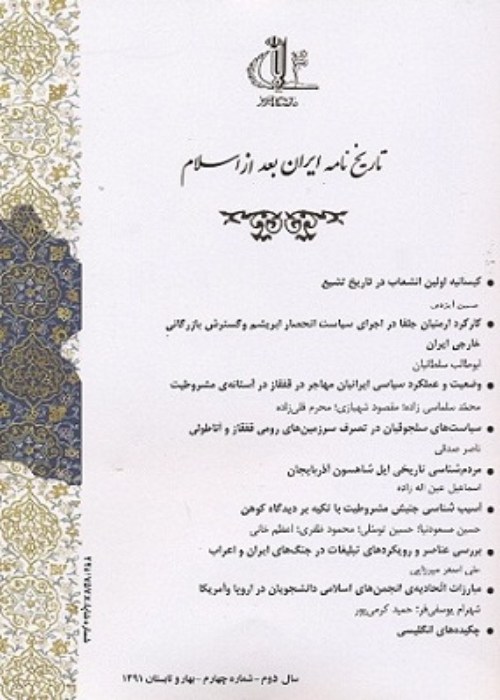Crisis Management in War-Torn Areas during the Reign of Shah Abbas I Safavid
During the reign of Shah Mohammad Khodabandeh, as the central government weakened, neighbors from the East and West invaded the borders and cities of the Safavid Empire. Shah Abbas also had to endure the presence of the Uzbeks and the Ottomans in parts of his country until the foundations of his rule were established. After that, he fought many battles to drive out the occupiers and confront their aggression; however, these wars were tragic for the lives of the inhabitants of the disputed areas. The question in the present study is, "what strategies did Shah Abbas I take to manage the crises caused by the wars?" This is a historical study implementing a descriptive-analytical approach. The findings of the study indicate that on the eve of the wars, Shah Abbas usually relocated the people in danger to safe areas, protected them by the military units, and carried out the scorched earth tactic. After the outbreak of war, he was trying to manage the situation through tax exemptions in the same year and the following year. Compensation from the Supreme Court, and the appointment of a ruler to stabilize the administrative situation and care for war-torn areas were among his other actions. He was also trying to provide emotional and social support for the orphans and the widows. During the reign of Shah Mohammad Khodabandeh, as the central government weakened, neighbors from the East and West invaded the borders and cities of the Safavid Empire. Shah Abbas also had to endure the presence of the Uzbeks and the Ottomans in parts of his country until the foundations of his rule were established. After that, he fought many battles to drive out the occupiers and confront their aggression; however, these wars were tragic for the lives of the inhabitants of the disputed areas. The question in the present study is, "what strategies did Shah Abbas I take to manage the crises caused by the wars?" This is a historical study implementing a descriptive-analytical approach. The findings of the study indicate that on the eve of the wars, Shah Abbas usually relocated the people in danger to safe areas, protected them by the military units, and carried out the scorched earth tactic. After the outbreak of war, he was trying to manage the situation through tax exemptions in the same year and the following year. Compensation from the Supreme Court, and the appointment of a ruler to stabilize the administrative situation and care for war-torn areas were among his other actions. He was also trying to provide emotional and social support for the orphans and the widows.
- حق عضویت دریافتی صرف حمایت از نشریات عضو و نگهداری، تکمیل و توسعه مگیران میشود.
- پرداخت حق اشتراک و دانلود مقالات اجازه بازنشر آن در سایر رسانههای چاپی و دیجیتال را به کاربر نمیدهد.


